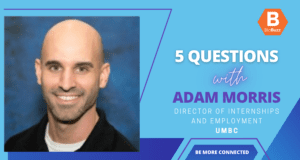
5 Questions with Nivedita Hegdekar, Scientific Writer, and Communications Co-Chair for the Women in Bio Capital Region Chapter
“5 Questions With…” is a weekly BioBuzz series where we reach out to interesting people in the BioHealth Capital Region to share a little about themselves, their work, and maybe something completely unrelated. March is WOMEN’S HISTORY MONTH and BioBuzz will celebrate by featuring Women in the BioHealth industry all month, especially in “5 Questions With…”. This week we continue the series with Nivedita Hegdekar, Scientific Writer, and Communications Co-Chair for the Women in Bio Capital Region Chapter.
Nivedita ‘Niv’ Hegdekar is a graduate student at the University of Maryland, Baltimore pursuing a dual degree in biomedical sciences and patent law. Prior to joining her PhD program, she obtained her degree in pharmacy and pharmaceutical sciences from the prestigious Institute of Chemical Technology, Mumbai, India.
In addition to her doctoral training, Nivedita has over 3+ years in small business development as well as science writing and communication. She serves as a contributing writer and scientific editor of magazines including the American Society for Biochemistry and Molecular Biology. She has also been active in key leadership roles and is currently serving as the President of the University Student Government Association at the University of Maryland, Baltimore, the Director of Marketing and Communication for the University System of Maryland Student Council, and Communications Co-Chair for the Women in Bio-Capital Region. Nivedita will be completing her education in Fall 2021 and is hoping to transition into a role in the BioHealth Capital Region shortly afterward.
1. Please introduce yourself to our audience with a look back at your education and career.
First of all, thank you for this opportunity to participate in BioBuzz’s “5 Questions With” series! My name is Nivedita Hegdekar (I encourage everyone to call me ‘Niv’!). I am currently a student at the University of Maryland, Baltimore working towards a Ph.D. in Biochemistry and Molecular Biology and an MS in Patent Law. I am originally from Mumbai, India, where I completed my undergraduate training is in pharmacy and pharmaceutical sciences. I moved to the US in 2014 for my graduate studies and have been a proud Baltimorean ever since!
My current research focuses on studying molecular pathways that potentiate long-term neuroinflammation following traumatic brain injury. My project has been a labor of love, and my lab has uncovered many fascinating insights about brain injury using cutting-edge molecular techniques. Passionate as I am about biomedical research, I have always been eager to gain other soft skills, hone my leadership abilities and find opportunities to get involved with the vibrant BioHealth Capital Region community.
I was introduced to Women in Bio (WIB) in 2018 and quickly became involved with their organizational efforts! In addition to serving as the Communications Co-Chair for the Women in Bio Capital Region chapter, I also volunteer as a scientific writer for ASBMB-Today, the member magazine of the American Society for Biochemistry and Molecular Biology, a scientific writer for STEMPeers, and a content editor for The STEMTimes.
One of the most personally fulfilling experiences during graduate school has been getting involved with student organizational leadership and institutional shared governance. Since 2017, I have been on the leadership team of the University Student Government Association at the University of Maryland, Baltimore, and the University System of Maryland Student Council. Being an extrovert and a ‘people person,’ I love collaborating and working with individuals from all walks of life!
2. As a Scientific Writer and Content Editor you must have a sense of trends. What do you think are going to the big topics for 2021?
I think science policy and science communication will be playing a crucial role in 2021 and beyond. The ongoing COVID-19 pandemic has been a strong reminder of the importance of science communication. Policy-makers, health care professionals, researchers, and affected citizens have realized that measures to contain the virus’s spread will only be socially accepted if there is effective communication among all stakeholders.
Scientists have so much knowledge to share with the world, but we often keep it to ourselves—hidden behind technical journals with expensive paywalls that are inaccessible and less comprehensible to the general public; meanwhile, conspiracy theorists and propagandists spew misinformation about science for free.
One way to address this problem is for scientists to engage more actively with the public and for science communication and policy to be used as a tool for education and better decision-making. While we cover issues surrounding COVID-19 and healthcare, there are other issues that will need to be communicated: climate change, equitable access of resources across different communities, and improving diversity, equity, and inclusion across STEM fields.
Working as a scientific writer and content editor, I have written many articles covering different aspects of the pandemic and the people who have been working around the clock in the fight against the pandemic. There are, and will be, many more stories to share with the public regarding these efforts. I truly believe that clear communication can galvanize public responses, reduce misinformation and improve scientific awareness.
3. You are also Co-Chair for the Capital Region Chapter of Women in Bio (WIB). Please re-introduce WIB to our readers.
Women In Bio (WIB) is a national organization committed to promoting careers, leadership, and entrepreneurship for all women in the life sciences. Our primary focus is to provide women-to-women mentorship and leadership support through all stages of career development — from the classroom to the boardroom. We offer ample opportunities for professional growth and leadership development. I first learned of WIB through an event hosted at my university and was quickly floored by the organization’s strong and supportive network. Subsequently, I attended many of their in-person events and webinars hosted by the organization and joined the organization in 2018 as a volunteer. I was drawn to the organization because of its mission – to serve as a platform to support and elevate women in all levels of science.
Women In Bio has been especially active during the pandemic and has been an excellent outlet for many of us to stay connected through virtual social events and engagement sessions. It has also been a beneficial support system for many who have been transitioning to different careers and balancing work-life commitments during these challenging times. For those interested in joining the organization: WIB offers many opportunities to learn, network, and most importantly, contribute! Please contact us if you are interested in volunteering or learning more about our activities!
LinkedIn: https://www.linkedin.com/showcase/wib-capital-region
Twitter: @WIBCapitalRgn
4. As someone here in the BioHealth Capital Region. Where do you see the biggest gaps, and how would you recommend they are addressed?
The BioHealth Capital Region (BHCR) has a wealth of research institutes, agencies, and life science companies. It is an exciting place to study and work in, especially given that it is positioned to be in the US’s top three biotech clusters by 2023!
In terms of gaps, I think one thing that will be crucial for long-term growth of the region will be recruiting and retaining a strong talent pool and promoting the BHCR brand. Given the powerhouse of research-focussed universities in our region, it will be important to encourage graduating STEM students and early career professionals to stay and join the BioHealth Capital Region workforce. Increased engagement with students and young professionals through better recruitment strategies, professional development training and internship opportunities will help bring more talent to the region.
I can share a personal example: in 2017, I was selected for a 4-month fellowship through the University of Maryland, Baltimore where I received hands-on training in the commercialization of innovative technologies discovered by university faculty. It was a phenomenal life-changing experience and since then, I have been involved with two other small business development projects!
These opportunities have strengthened my bond with the Maryland biotech scene and I strongly believe similar efforts from biotech companies, and especially startups, can really be game-changers in the efforts to retain young talent in BHCR. Overall, continued collaboration, partnership, entrepreneurship will play a strong role in strengthening our region, and it will also be important to market these efforts to potential relocators.
5. What are some things outside of work that you’re irrationally passionate about? Tell us about it.
My most recent passion has been learning to play the piano! I love playing musical instruments- growing up. I was trained in the harmonium (classical Indian musical instrument) and the flute. I took a hiatus from many hobbies during graduate school, but the pandemic has taught me the importance of self-care and making time to pursue activities that bring true happiness.
I am also currently training for a half marathon! I used to be a dedicated runner until an accident resulting in a double ACL tear in 2016 caused a significant setback. It was an uphill battle, but I am happy to share that I am back at running! I love running around the Baltimore Harbor during the early morning hours (fewer people, so more COVID-19 safe!) as the outdoors keeps me rejuvenated for the day’s work. I look forward to participating in some races in the post-pandemic world.
Thank you Nivedita Hegdekar, Scientific Writer, and Communications Co-Chair for the Women in Bio Capital Region Chapter for participating in the ‘5 Questions with BioBuzz’ series, and stay tuned for more interviews with others from across the BioHealth Capital Region and beyond.





